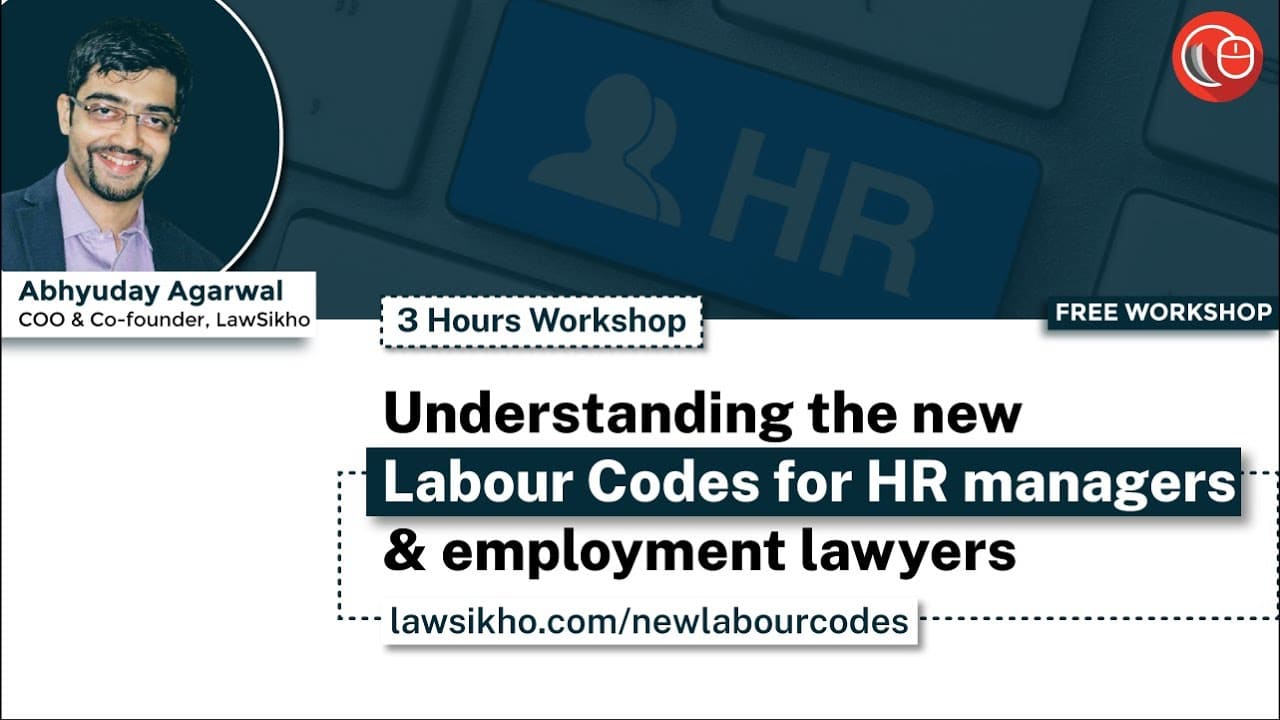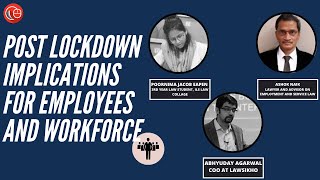 Duration - 6 Month, 8-10 hours/week
Duration - 6 Month, 8-10 hours/week
 Course fee: - INR 66000
Course fee: - INR 66000
Key Highlights

Learn how to conduct disciplinary proceedings, including appreciation of evidence and drafting various kinds of notices and orders

Learn how to draft various kinds of organizational policies, employment and consultancy contracts, manpower supply contracts, etc.

Learn how to check contractor compliance and shield your organization from defaults by contractors

Learn how to respond to notices by various statutory authorities - labour commissioners, ESI and PF authorities, etc. and what to do if proceedings are initiated before labour commissioners or labour courts

Prepare foolproof documentary trails to defend the organization effectively in the event of legal proceedings

Develop competence in industrial relations and disputes, dealing with trade unions, handling conciliations, bipartite and tripartite settlements, etc.

Simulation case studies on compliance requirements under the Payment of Gratuity Act, Employees State Insurance Act, Contract Labour Act, Shops and Establishments Act

Learn how to draft briefing notes on critical labour issues for management and external lawyers

Perform practical exercises on termination of employment, maternity benefits, POSH Act, CSR work, ESOP plan etc.

Master the new Labour Codes and ongoing developments
Introduction
Are you an HR Manager? Do you want to identify ways to take up additional opportunities at work and grow?
Do you want to use advanced legal skill sets to shift to senior positions, newer jobs or to other industries?
Are you struggling to work with external labour consultants? Is it difficult to understand the logic behind their advice? Do you feel the need to understand labour laws yourself to coordinate more effectively?
Do you feel that advanced legal knowledge would enable you to work more effectively?
Do you want to be able to deal with labour inspections, disciplinary proceedings, trade unions and drafting work? Do you want to assist the management in employment and labour-related legal proceedings?
Are you an HR consultant (or do you want to become one)? Do you want to add new and highly profitable services to offer your clients? Apart from compliance work, do you feel that legal knowledge, drafting skills, and understanding of industrial disputes will help you?
Why is it necessary for HR managers and HR consultants to learn labour, industrial & employment laws?
#1 - In-house legal teams are not always accessible to resolve everyday legal challenges
In-house legal and secretarial teams are not expected to be hands-on with respect to legal challenges faced by HR managers on an everyday basis. Unless there is an issue that has blown out of proportion and escalated to the legal team, they do not get involved. Everyday work is in the hands of HR managers working in the area of payroll, IR/ ER. They need to have detailed knowledge of labour & employment laws and understand the legal implications of their actions.
#2 - ‘Blind’ dependence on external consultants is not the best way to address long-term risks
On a small scale, labour issues related to compliance, inspections, etc. can be outsourced to external consultants as a ‘band aid’ to deal with violations. However, as organizations grow, hands-on knowledge of the legal issues with in-house teams leads to better outcomes.
#3 - Mistakes can prove expensive, leading to the risk of imprisonment for directors, huge fines, compensation, inspections and reputational danger
Several labour laws prescribe imprisonment of senior-level managers and directors for violation. Similarly, improperly conducting termination proceedings can lead to expensive legal claims, compensation and even adverse reputational consequences. This is especially likely if the exiting team member has been disgruntled, angry or vengeful.
#4 - Everyday work and decision-making requires legal insights
An HR manager needs to use legal insights in everyday tasks, such as:
- Creation of appointment letters, drafting various HR and employment policies
- Compliance with various labour legislations
- Drafting employment agreements,
- Conducting internal training
- Drafting standing orders and amendments,
- Drafting letters to contractors,
- Conduct of disciplinary proceedings
- Drafting various notice and orders for disciplinary proceedings, such as order of suspension, dismissal, etc.
- Protection of data theft and organizational equipment, preparation of exit-memos
- Maintenance of a documentary trail
- Inspection-preparedness
- Response to notices from statutory authorities
These tasks require a certain command of legal knowledge, insights and drafting skills, otherwise, an HR manager will struggle.
#5 - Unionized industries require specialized legal knowledge
In unionized industries, the risk of labour unrest is very high. Hence, HR managers need to be especially careful that they do not make legal mistakes.
Their main areas of work include:
- Collective bargaining negotiations, bipartite and tripartite settlement agreements, conciliation before the labour commissioner,
- Preparation of evidence and document trail for litigation,
- Representation of management in industrial courts and labour tribunals,
- Issues related to trade union recognition and strikes, etc.
Knowledge of retrenchment, termination, change of terms and conditions, drafting of settlement agreements, representation in legal proceedings before labour courts and industrial tribunals is very important to be able to deal with these situations effectively.
These are heavily regulated and technical matters, requiring legal knowledge and drafting skills.
#6 - Service sector organizations need continuous employment law-related assistance owing to increased regulations
Earlier, labour laws primarily affected the manufacturing sector, and even enforcement was often lax. The focus was on managing inspections and basic compliance. Litigation or arbitration between employers and employees used to be very rare in the private sector. The private sector was small. Today, the service sector, including the IT industry, is heavily impacted by serious laws such as the anti-sexual harassment law, maternity benefits amendment, the four labour codes, whistleblower law, anti-bribery law, data protection law and CSR.
However, they face the following challenges...
#1 - Labour law framework in India is very complex and unclear
Labour laws in India are technical. There are several overlaps in labour laws, confusion about which labour law is applicable when. At times, both Central and State Governments have passed rules on a particular issue. For HR managers, and sometimes even for lawyers, it becomes difficult to identify which law applies to a particular real-life situation.
The position from state to state also varies. It is difficult to understand the provisions as well, and HR managers have to often blindly rely on an external consultant’s view, without knowing the reasons for it.
#2 - Frequent amendments and changes require constant up-gradation of skills
Frequent amendments and clarifications require HR managers to stay on top of the latest position from time to time. For example:
- COVID-19 lockdown brought a series of changes that made it difficult to downsize or reduce the wages of employees during the lockdown. Then, there was a U-turn with exemptions from specific labour law provisions altogether in certain states, and keeping track of it was difficult for someone who was not trained in navigating the legal framework already.
- Proposal to introduce four new Labour Codes (Code on Wages, Industrial Relations Code, Code on Social Security and Occupational Safety, Health and Working Conditions Code) require HR managers to be prepared with upcoming changes in the law.
- Amendment to the Maternity Benefits Act, requiring 6 months of maternity benefit to be given, requires HR managers in both the service sector and manufacturing sector to increase compliance.
- Passing of the Sexual Harassment of Women at Workplace (Prevention, Prohibition and Redressal) Act, 2013 or POSH Act, 2013, the occurrence of the #metoo movement and increase in complaints has led to a focus on implementation.
- Other notifications such as the increase in the threshold of the Payment of Wages Act, clarifications from EPFO or to the ESI scheme, etc. frequently impact the everyday work of HR managers.
HR managers need to understand labour laws in a fairly advanced manner to execute everyday decisions correctly.
# 3 - B-School learning and MBA degree materials are cramming-oriented and cannot be applied to real-life scenarios
Those who study labour laws in their MBA (HR) course, cram some provisions of the statutes and names of the forms but find it difficult to retain and apply this learning to real-life scenarios. Teaching is mostly full of jargon and non-relatable. Except for basic payroll-related work, HR managers do not find the learning from MBA courses to be useful for the performance of real-life tasks.
# 4 - Learning drafting skills is difficult
Drafting skills are crucial for performing everyday tasks. Drafting errors can have legal consequences and increase risks or costs for the organization.
Some of the consequences of bad drafting are explained below:
- Erroneous drafting of employment contracts or HR policies can lead to failure in protecting the organization’s interest.
- Failure to effectively respond to show-cause notices from labour inspectors can lead to their initiating criminal proceedings.
- Incorrect drafting of documents related to disciplinary proceedings can lead to setting aside a dismissal order, reinstatement with back wages, or compensation claims by employees.
These are merely some examples of documents drafted by HR managers. The real list is much longer.
These drafting skills are not taught in MBA courses, the Company Secretary course, or even in law schools.
How can you use expertise in labour and industrial laws in your career?
#1 - Set up your own HR consultancy practice or add new services to your existing practice
Companies are in need of experts to help with labour, employment and industrial relations issues, and there are very few experts in the market to tap into these opportunities with any credible skills or knowledge of labour law.
Setting up a consultancy allows you to work with freedom and have autonomy. Those who are interested in working on a part-time basis and yet earn enough to lead a good quality of life can do that.
You can consult clients in a variety of areas which are mentioned below. You can either provide specialized services in a particular area, such as employment policy creation, training and implementation, or focus on a particular client segment, such as technology startups, or SMEs.
Several HR and labour compliance consultants have expanded the scope of services offered to clients after taking up this course. You can learn about their experience by watching some of the feedback videos that we have placed on this page.
#2 - Secure increment or promotions in your existing job (grow till senior HR manager or HR director position)
Knowledge of various law and drafting-related skill sets will enable you to take up additional responsibility at work, and increase the chances of increment or promotion in your existing job.
If you are not looking at HR-related legal issues, you can take it up additionally and help your organization.
If you were earlier only working on payroll management or limited aspects of compliance, you can take up policy and notice drafting, the conduct of disciplinary proceedings, inspection preparedness, and other strategic work to grow.
As you develop various law-related skill sets, your decision-making and negotiation ability will improve significantly. You will be able to execute initiatives better, minimize future risks and obtain better deals from third parties. Your overall effectiveness will increase.
#3 - Create opportunities for lateral shifts: Be prepared for positions in both manufacturing and service sector organizations
If an HR manager works in an organization that has a presence in say 2 or 3 states in a particular region, they find it difficult to move to a pan-India organization, or an organization with a presence in other states, because they cannot navigate the state-level legal framework in states where they have not worked earlier.
Similarly, an HR manager working in a service-sector company often finds it difficult to work in the manufacturing sector or in a company with a unionized workforce, as the legal framework and issues are different.
Advanced skill sets with respect to labour, industrial and employment laws will enable such transitions.
#4 - Secure your first job in HR, especially in industrial/ employee relations roles
Fresh graduates or students pursuing a graduate or postgraduate degree who want to work in HR or industrial/ employment roles will find this knowledge useful in securing their first job. They will be able to demonstrate superior knowledge in job interviews and in internships.
Top 10 organizational initiatives which HR managers can effectively implement through legal skills
- Prepare a nationwide compliance management framework (irrespective of the location of operation or industry-sector)
- Create and execute appropriate documentation with your employees, consultants, vendors and others to achieve the organization’s goals
- Implement customized policies as per the need of your organization
- Learn how to appropriately conduct disciplinary proceedings and enforce appropriate consequences for disciplinary violations?
- Handle inspections and respond to show cause notices
- Manage concerns and needs of trade unions effectively
- Deploy strategies to minimize employment-litigation risk and avoid punitive actions by the labour department
- Prepare comprehensive document trail, brief lawyers and assist lawyers in employment and labour law cases
- Implement CSR budgets, policy, conduct CSR audits, create reports
- Conceptualize, implement and manage compensation and benefits keeping in mind law relating to ESOPs, Sweat Equity and even directors’ remuneration and severance packages (if you are operating in an HR director position)
5-step approach for HR managers & consultants to be empowered with legal skills
Step 1: Learn to navigate the legal framework with confidence (even without a law degree!)
How do you identify the applicable legal framework, especially for a new state, a new type of organization or for a new industry? How do you read and interpret the law without fear of making a mistake?
This is the biggest challenge faced by HR managers.
What if you could learn to understand how to navigate the legal framework of any state without a law degree? You will also not need to cram any provisions.
You learn to find out what you need, when you need it, and make sense of it.
You will learn this approach through weekly online classes of approximately 1.5 hours (recordings available for those who miss), study materials and practical tasks.
Step 2: Develop drafting and review skills through simulation exercises and perform real-life work confidently
Drafting is a crucial skillset to succeed in everyday work. The most common drafts prepared and reviewed by HR managers are:
- Drafting various kinds of organizational policies
- Drafts with respect to disciplinary proceedings
- Drafts and records of various meetings
- Agreements with employees, consultants or contractors
- Various kinds of contractual letters and claims
- Responses to show-cause notices by labour authorities or to claims made before labour authorities by employees
- Review of legal documentation and substantiation with documentary evidence
- Drafts of settlement agreements pursuant to conciliation with unions
Apart from drafting and review-related work, you will also learn how to create a documentary trail of different kinds of records and proceedings. You can assist the legal team in enforcing the company’s interest or defending the organization from claims more effectively.
Step 3: Prepare customized dashboards, charts, action lists and calendars to prepare for additional work responsibilities
Every HR manager and HR consultant deals with a different set of scenarios at work. Some HR managers may be working deeply in the manufacturing industry, while others may be in the service sector. The states in which they work may be different.
Some may work in a statutory organization or a government-controlled company, while others may work in a 100% private organization.
The goals in each case are different. Therefore, a course must provide you with the space to customize the learning to your needs.
How do we do that? By giving you some really interesting homework that enables you to apply all the exercises to your existing work profile.
You will identify the custom need for yourself, create lists of labour authorities applicable to your situation, prepare interesting checklists and calendars, prepare a priority-wise list of legislations to comply with, allocate zonal-level responsibility in exciting ways, identify how you can contribute to CSR initiatives in your organization, and perform several other tasks that are designed to meet your unique priorities at work!
Step 4: Stay ahead of the situation by implementing preventive tools and preparation for future complications
HR managers are the first line of defence as well as an offence when it comes to labour and employment laws.
Lawyers get involved much later when there is limited room for manoeuvres.
In reality, the destiny of most labour and employment law disputes, as well as compliance, strategy as well as procedures and documentation is decided by HR managers.
HR managers do not have a complete understanding of what will happen if a situation in which they are involved escalates into full-blown proceedings.
Lawyers cannot change the facts, or control what happened before the matter came to them. Usually, they are briefed when legal proceedings have already been initiated. There is little room to improve the facts. They have to use their legal skills to manage the situation.
Now, what if you could take actions in the present to gain full knowledge of what to do if there is a situation in the future (e.g. employment litigation, industrial dispute, arbitration or other labour proceedings)?
What if you could also implement some unique measures in your organization to remove pre-identified risks?
Will that enable you to make better decisions, reduce risk and be more effective at work? Would that secure you the appraisal of the management or your clients’ appreciation?
We will cover unique organizational policies, exit memos and also undertake the study of litigation so that you or your organization are not caught off-guard if an employee initiates legal proceedings against you or the organization you work in. You will also feel comfortable with the initiation of legal proceedings to enforce the organization's interest where necessary owing to better preparation and knowledge.
Step 5: Improve every week through a multi-layered coaching framework
The problem with online courses has been that they are ‘dead’ or ‘passive’’ - you have to read some study materials, watch videos, attempt an MCQ test and get the certificate. Online courses are traditionally not designed to enable you to apply learning at work.
Now, imagine if you had someone to handhold you as you learned about the legal system, drafting skills, litigation-related aspects, document-trail preparation and even the customized dashboards and charts that you prepared for your own organization!
Would that help you learn better? Would it improve your chances of realizing your career goals?
I am quickly sharing our multi-layered coaching framework to help you succeed in the course and apply your learning at work to grow in your career.
- Briefing in the online classroom on how to solve simulation assignments
- Group feedback in the online classroom on your performance
- Personalized evaluation with in-line corrections and coaching on your submissions
- Doubt-clearing for questions you may face in connection with study materials or at work
- Other career-related guidance if you face a difficulty
Major Labour Legislations Covered
- Apprentices Act, 1961
- Building And Other Construction Workers (Regulation Of Employment And Conditions Of Service) Act, 1996
- Child Labour (Prohibition and Regulation) Act, 1986
- Industrial Relations Code, 2020
- Code on Wages, 2019 and Code on Wages (Central) Rules, 2019
- Code on Social Security, 2020
- Occupational Safety, Health and Working Conditions Code, 2020
- Contract Labour Act, 1970
- Employees’ Provident Funds and Miscellaneous Provisions Act, 1952
- Employees’ State Insurance Act, 1948
- Factories Act, 1948
- Employment Exchanges (Compulsory Notification of Vacancies) Act, 1976
- Industrial Disputes Act, 1947
- Standing Orders Act, 1976
- Maternity Benefits Act, 1961
- Maharashtra Recognition Of Trade Union And Prevention Of Unfair Labour Practices Act, 1971
- Minimum Wages Act, 1948
- Sales Promotion (Employees Conditions of Services) Act, 1976
- Trade Unions Act, 1965
- Payment of Bonus Act, 1965
- Payment of Gratuity, 1972
- Payment of Wages Act, 1936
- Sexual Harassment of Women at Workplace (Prevention, Prohibition and Regulation) Act, 2013
- Workmen’s Compensation Act, 1923
From time to time, we will deal with the Companies Act and Rules and the SEBI framework,
The four new labour codes (listed above) are also covered so that you are prepared for a smooth transition from the existing framework.
* Service law concepts for Central/ State Public Services are not covered. However, statutory corporations and government companies are subject to the labour law framework.
Who should take this course?
- HR managers who are required to perform compliance and other law-related tasks, or who are in an industrial relations/ employee relations profile
- HR and labour consultants
- Company secretaries and chartered accountants who wish to help their clients to comply with labour laws
- Lawyers who want to work in the employment practice of a law firm, or supervise HR functions
Potential employers
- Large companies with a pan-India presence
- SMEs and startups
- HR consultancy firms
What is unique about this course?
- We are the only organization in India which conducts such comprehensive labour, employment and industrial law course. Other online or physical training programs are also primarily compliance-oriented. They do not teach other skills around drafting, conducting disciplinary proceedings, inspection preparedness, decision-making guidance, and skillsets relevant at Senior HR Manager or HR Director level positions. Training hours and guidance are much lesser, with barely any practical exercises, in comparison to this course.
- The course is not limited to a provision-by-provision study of some statutes and associated case laws.
- The course trains you on different kinds of actual work that is required to be performed by HR managers, directors, in-house legal teams and other professionals.
- After finishing the course, you will know as much practical knowledge as a junior employment lawyer working at a top law firm would be expected to have after a year or two of experience.
- Understanding of the four new Labour Codes, i.e. the Code on Wages, Industrial Relations Code, Code on Social Security and Occupational Safety, Health and Working Conditions Code is included.
- You will not be awarded the certificate/ diploma unless you complete all the exercises. You have to spend 8-10 hours per week on this course.
- You will get personal attention and coaching from the trainer, and get individual feedback on the quality of work you produce
- You will be writing an article every month and with our guidance publish the same either on iPleaders blog or various other industry publications
- We also recommend this course to other professionals like in-house counsels, labour lawyers interested in understanding the organizational perspective and CS professionals who can immensely benefit from this knowledge.
Money-back guarantee
If you take this course, follow it diligently for a month, do all the exercises but still do not find value in it, or not able to understand or follow it or not find it good for any reason, we will refund the entire course fee to you. It is a 100% money-back guarantee with only one condition, you must pursue it properly for a month. If you don’t find it valuable after that, get your entire money back. All refund claims are subject to strict compliance with the refund policy here.
Training Methodology

Online 24/7 access
Access to basic study material through an online learning management system, Android and iOS app

Practical Exercises
2 practical exercises every week, followed by written feedback

Live Online Classes
Based on the exercises, there will be a live video-based online class. You can ask questions, share your screen, get personal feedback in this class.

Convenient Class timings
Classes are held after regular work hours. Typically classes are kept on Sunday afternoon or 8-9 pm on other days.

Live Doubt Clearing
You can ask questions, get your doubt cleared live as well as through online forums
Specific Learning Objectives
- Learn how to navigate the maze of overlapping central and state laws and notifications
- Identify how to maintain simplified record-keeping systems and claim exemptions for SMEs
- Learn how to identify risks and draft customized organizational policies for risk mitigation
- How to map the risk of liability for directors and managers for labour law violations in any organization
- How to create an organization-specific risk-minimization strategy in respect of labour law violations
- How to create an organization-specific risk-minimization strategy in respect of labour law violations
- How to implement an internal labour audit framework to minimize risk
- How to deal with employees who steal valuable organizational data
- How to enforce a breach of confidentiality by an employee or consultant
- How to deal with employees who start competing businesses with team members
- How to proceed against an employee who is in double employment
- How to take action against a manager for violation of the Code of Conduct
- How to draft a contract of apprenticeship or a NEEM Trainee
- How to customize an appointment letter for an employee
- How to draft an employment contract for a manager
- How to draft a fixed-term employment contract
- How to draft and submit standing orders for certification
- How to amend certified standing orders
- How to minimize risk while engaging contractors for the supply of labour
- How to structure contracts and work orders for the supply of contract labour
- How to structure effective retention bonuses for employees
- How to deal with pending salaries, workmen’s dues and other amounts during insolvency.
- Learn how to draft and issue show-cause notices for misconduct
- Process of conducting disciplinary inquiries
- How to impose a fine on a delinquent employee
- How to draft letters of termination for disciplinary reasons
- How to terminate employees on medical grounds and discharge simpliciter
- How to draft exit memos to minimize legal risks from an exiting employee
- Learn how to draft various employment policies and obtain employee consent for employment handbook
- How to deal with illegal strikes and unfair labour practices
- How to handle labour disputes under the Industrial Disputes Act
- Implement best practices on dealing with labour for management when a dispute is referred to a labour court
- How to draft bipartite and tripartite settlement agreements in industrial disputes
- How to execute a transfer of workforce in case of an M&A transaction
- How to implement ESOP Plans to incentivize employees
- Tax issues in secondment arrangements with foreign companies
- FDI regulations for ESOPs to foreign employees
- How to and deal with notices for non-compliance with various labour laws
- How to prevent ex parte orders against the organization
- How to respond to regulatory show-cause notices
- Learn how to draft customized organization-specific policies
- How to obtain acceptance for various applicable policies and employee handbook
- How to protect confidential data of the organization through policies for external consultants, apprentices and interns
- How to implement organization-wide anti-sexual sensitization programs for different types of the workforce and external consultants
- How to handle sexual harassment complaints and conduct inquiry
- How to implement organization-wide sensitization plans
- Models for engagement of external experts in the organization
- How to prepare a documentation docket and other compliance frameworks for ICC
- How to issue various notices on behalf of ICC
- How to draft a legally valid decision and issue recommendations of ICC
Recruitment and Internship Support
Many employers, law firms and companies are happy to recruit our high performing students, owing to their advanced skill sets.
If you do well in your exercises and classes, we can help you improve your profile or secure career opportunities.
We will guide you on how to improve your profile through various career development sessions over the duration of the course. Such career development sessions are aimed at improving your CV, interview skills, providing guidance on the application process, and even on how to start your own consultancy practice.
You can also schedule one on one consultations with our placement cell.
If you are a lawyer or law student, we can help you find an internship or job opportunities in law firms to get jobs, internships and assessment internships in good law firms, including the employment practice of law firms.
List of Weekly Exercises
- Identify applicable labour laws for different branch offices of your organization
- Prepare a labour law compliance calendar
- Maintain unified registers for a small enterprise and identify applicable exemptions
- Determine working hours, overtime, holidays, leaves and other facilities to be provided to your team as per the Shops and Establishments Act
- Draft an Appointment Letter as per a state-level Shops and Establishments Act
- Identify working conditions to be provided to Apprentices, NEEM Trainees, Interns, Consultants, Factory-Workers, Contract Labourers
- Identify compliance requirements under the Payment of Gratuity Act
- Identify the grounds on which differential remuneration can and cannot be paid under Indian law to employees
- Draft key restrictive clauses in an Employment Agreement and in a contract with a contractor
- Prepare Standing Orders for workmen in a factory
- Identify the working conditions to be provided to contract labourers by the principal employer
- Draft a Consultancy Agreement for the appointment of a consultant
- Create a chart for compliance with the Employees State Insurance Act
- Determine when you can/ cannot engage child labour in a factory
- Determine eligibility requirement for statutory bonus, calculation and computation of liability for your organization
- Prepare a checklist to check compliance of a contractor with the Contract Labour Act
- Select whether to hire consultants, employees, contract-workers or fixed-term employees in different scenarios
- Draft amendments to media policy and Whistleblowers’ Policy and identify the procedure to obtain employee consent
- Prepare a compliance process document for your organization to comply with Maternity Benefit Act (as amended in 2016)
- Prepare a Maternity Benefit Act compliance audit checklist
- Prepare a list of actions to be taken to comply with the Sexual Harassment of Women at Workplace (Prevention, Prohibition and Redressal) Act, 2013
- Identify steps to be taken in case of a violation of a provision of employees’ code of conduct
- Draft and issue a show-cause notice to an employee for violation of an applicable condition under standing orders
- Draft and issue a show-cause notice to an employee for violation of a provision under the organization’s Code of Conduct
- Identify the steps in a disciplinary proceeding against a delinquent employee
- Levy a fine for employee misdemeanour and non-performance
- Draft order of dismissal for misdemeanour/ violation of standing orders/ organizational policies
- Draft a notice for termination of an arrangement with a consultant for convenience and for breach
- Prepare an Exit Memo
- Prepare an organizational strategy for a government inspection/ raid
- Identify key terms of a labour-management settlement
- Identify possible steps to address labour unrest at a factory
- Determine whether a strike in your factory is legal or not
- Identify which officers are legally responsible for a factory accident
- Draft a bipartite and tripartite settlement agreement between workers’ trade union and employer
- Draft an Anti-Sexual Harassment Policy for your organization (including new amendments where you subsequently identify gaps in the policy)
- Create an Internal Complaints Committee and prepare a notice for employees
- Prepare a sensitization PPT and implement an anti-sexual harassment sensitization plan for employees in your organization
- Identify the ICC’s role and next steps for an inquiry once a complaint is filed
- Identify interim measures and punishments that the ICC can award if the respondent is guilty or if a false complaint is filed.
- Identify responsibilities of directors, occupiers, managers and other officers for key labour law violations
- Comply with obligations under the Employee State Insurance Act
- Exercises on Consequence of Violation of Labour Laws
- Exercises on Legal Obligations Other Than Maintenance of Simplified Registers and How Action for Labour Violations Can be Initiated
- Drafting a show-cause notice and requirements of natural justice
- Draft an inquiry report and daily order sheet
- Exercises on the Maternity Benefit Act
- Draft Amendments to Standing Orders and Prepare an Internal Advisory Note on Compliance Strategy
- Identify the hierarchy of labour courts and create a vendor diligence checklist
- Exercise on How to draft a Manpower Supply Agreement
- Exercise on How to draft a Contract of Apprenticeship
- Exercises on Disputes under Payment of Gratuity, Provident Funds, ESI and Civil Suits
- Exercises on Disputes under the Industrial Disputes Act, Standing Orders Act and Payment of Wages Act
- Exercise on Code on Wages
- Identify the appropriate forum and appellate authority for a labour dispute
- Draft Executive Employment Agreements
- Exercise on Enforceability of Restrictive Covenants Incorporated in Employment Contracts
- Exercise on Trade Union Disputes
- How to draft an appeal and a writ petition in labour matters
- Exercise on Employees Stock Option Plans (ESOPs)
- Exercise on Profession Tax Registration & Compliance
- Exercise on Code on Wages (Central) Rules
- Exercise on Industrial Relations Code Bill
- Exercises on Drafting a briefing note on the transfer of workmen and a transfer letter
- Exercises on Drafting a notice to the contractor and an inquiry report
- Exercises on Create a process for inspection preparedness for your factory/office
- Exercises on Pension and Provident Funds Contribution
- Exercises on Engagement of Minors to Work and Drafting of a Response to a Labour Authority
- Exercises on Termination of Employment
- Exercises on Drafting of an Employment Policy
- Exercises on POSH Act: Applicability, Key Definitions and Difficult Scenarios
- Exercises on implementation of confidentiality, redressal timelines & ICC’s recommendations under POSH Act
- Exercises on Inter-State Migrant Workmen and Building and Other Construction Workers Act
- Exercises on drafting and validity of employment bonds, non-solicit and non-compete clauses
- Exercise on limits of remuneration payable to directors of companies, severance compensation, clawback clauses and regulation of related party transactions.
- Exercises on implementation of Corporate Social Responsibility at work
Plus article writing exercises (1 per month)
(We will guide you on how to write. Articles will be published on iPleaders blog if they are of publishable quality.)
Plus Career building and networking exercises (1 per week)
Key segments of the course
Learning so many aspects can appear daunting. Here is a quick indicative structure of how you will study the course. The sequence for your batch may vary, i.e. you may not start from the first segment. New components may be introduced.
Some of the tasks you will learn across the different segments are:
- Dashboard creation to map list of authorities,
- Inspection-preparedness,
- Compliance checklist/ calendar creation,
- Consequences for a violation, especially for directors,
- Drafting - such as a notice to an employee, response to a show-cause notice, amendment of the standing order, etc.
- Relevant labour code changes,
- Litigation-related aspects
- 1 recent development (if any)
Wages and Benefits
Wages
- Equal Remuneration & Payment of Wages
- Payment of Gratuity
- Bonus
Benefits
- Maternity Benefit
- PF & Pension
- ESI & Employees’ Compensation
Industrial Relations & Contract Labour
Contract Labour
- Contract Labour Act compliance requirements, Obligations of Principal Employer under the Payment of Wages Act, 1964, the Gratuity Act, 1972, the Employees’ State Insurance Act, 1948, the Employees’ Provident Fund & Miscellaneous Provisions Act, 1952
- Manpower Supply Agreements (drafting of a letter to claim indemnity, letter/ response to labour commissioner)
- Liability and Recovery Proceedings
Industrial Relations
- Factories Act and Rules - compliance
- Response to a notice from Factories Inspector
- Trade Unions (Recognition, Legal & Illegal Strikes, Settlement Agreements, Variation of terms of employment when there is a pending dispute)
- Standing Orders (Applicability, Drafting, Amendment, Industrial Relations Code).
Labour Litigation
- Response to claims
- Appeals
- Writ
Shops and Establishments and Executive Compensation
Shops and Establishments (applicability, appointment letter, compliance requirements, exemptions, connection with POSH, etc.)
Profession Tax, Working on Festivals and Holidays, Overtime, Staying back late
Executive compensation
- Executive employment agreement (drafting, non-solicit, non-compete, IP assignment)
- ESOPs
- Exit Memo
- Gardening leave, severance compensation & Clawback
- Enforcement of non-compete/ non-solicit (case law + notice drafting)
Organizational Policies & Disciplinary Proceedings
Organisational Policies
- Code of Conduct (drafting, amendment, implementation)
- Whistleblower
- POSH (policy, compliance & concepts)
- Proceedings for violation
Disciplinary Proceedings
- Natural Justice & Order Sheet, Inquiry report - done
- Non-confirmation of a probationary employee - done
- Termination/ discharge for absenteeism and medical grounds
Industry Academia Panel

Esha Shekhar,
Independent Corporate Counsel | Corporate Advisory and Compliance | Trainer- POSH and gender laws

NITISH CHOPRA,
Advocate, Chopra Associates

ASHOK NAIK,
Lawyer & Adviser on Employment & Service Law Matters, Ex-Senior Vice President & Head Employee Relations at IndusInd Bank Limited (35+ years’ experience)
Here are some of our faculty members
Syllabus
SCOPE OF THE COURSE, LABOUR LAW TOOLS AND COMPLIANCE FUNDAMENTALS 
![]() How to comprehend national and state-level labour laws
How to comprehend national and state-level labour laws
- Powers of Centre and States under the Constitution to make labour-related laws
- Central Laws
- State-Level Laws and Notifications
- Key terms in labour legislations
![]() Major Compliance Tasks for an HR Professional
Major Compliance Tasks for an HR Professional
- Maintaining records
- Obtaining registrations
- Display of notices
- Filings and returns
- Remittances
- Periodicity of compliance
- Whom to engage for compliance
- Provisions for accounting and reserves
![]() Exemptions from compliance
Exemptions from compliance
Reduced compliance for SMEs: Labour Laws (Exemption from Furnishing Returns and Maintaining Registers by Certain Establishments) Act, 1988 and 2014 Amendment
Simplified registers under Ease of Compliance to Maintain Registers Under Various Labour Laws Rules, 2017
![]() Prevention, implementation and monitoring tools
Prevention, implementation and monitoring tools
- Risk identification and assessment
- Policy-creation
- Training systems and upgradation plans
- Use of surveys & feedback systems,
- Random inspections and labour audits
- Investigation and escalation tools
- Disciplinary Actions and enforcement strategies, upgradation plans
![]() How to perform Internal Labour Audits
How to perform Internal Labour Audits
![]() Responsibility for violations under labour law statutes & risks for directors
Responsibility for violations under labour law statutes & risks for directors
![]() Practical Takeaways
Practical Takeaways
Checklist of consequences of major labour law violations
Types of contracts with workforce and organizational policies 
![]() Capacity in which workforce can be engaged
Capacity in which workforce can be engaged
- Employee
- Consultancy Agreements
- Fixed term arrangements
- Work-from-home arrangements
- Part-time and Piece-Rated Arrangements
- Contract-labour arrangements
- Internships and trainee arrangements
- Apprentices
- NEEM Trainees
![]() Child labour and legal validity
Child labour and legal validity
![]() Comparison of penalties: Child Labour Act, 1986 and amended Child Labour Act, 2016
Comparison of penalties: Child Labour Act, 1986 and amended Child Labour Act, 2016
![]() Contractual instruments
Contractual instruments
- Letter of appointment
- Employment contract
- Standing Order
- Consultancy Agreement
- Secondment Agreement
![]() Relevance of Industrial Employment (Standing Orders) Act, 1946
Relevance of Industrial Employment (Standing Orders) Act, 1946
![]() How to draft and get Standing Orders approved
How to draft and get Standing Orders approved
![]() Obligations under Employment Exchanges Act
Obligations under Employment Exchanges Act
![]() Special clauses and their enforceability in contracts
Special clauses and their enforceability in contracts
- Penalty clauses
- Non-compete
- Non-solicit
- Employment bonds and lock-ins
- Confidentiality
![]() How to work with contractors
How to work with contractors
![]() How and when to engage contract labour, terms and conditions of engagement and responsibilities of principal employer and contractor
How and when to engage contract labour, terms and conditions of engagement and responsibilities of principal employer and contractor
![]() Valid forms of acceptance of employment contract and employee handbook
Valid forms of acceptance of employment contract and employee handbook
![]() How/ when to create new organizational policies or customize existing policies
How/ when to create new organizational policies or customize existing policies
![]() Major organizational policies and their formats
Major organizational policies and their formats
- Code of Conduct
- Whistleblower Policy
- Anti-Sexual Harassment Policy
- Business and Travel Policy
- Conflict of Interest Policy
- Customer data policy
- Data Security Policy
- Dating Policy
- Dress Code
- Equal opportunity policy
- Health and Safety Policy
- Leave and Attendance Policy
- Media Policy
- Personnel File Policy
- Physical Contact with Customers
- Anti-Sexual Harassment Policy
- Probation Policy
- Social Media Policy
- Computer Equipment and Internet Usage Policy
- Protection of IP from Employees, Consultants and Vendors
![]() Employment Agreements
Employment Agreements
![]() Enforceability of Restrictive Covenants in Employment Contracts
Enforceability of Restrictive Covenants in Employment Contracts
![]() How ESOPS work
How ESOPS work
![]() Tax on ESOPs and Sweat Equity
Tax on ESOPs and Sweat Equity
![]() Law governing CXO and top executive compensation
Law governing CXO and top executive compensation
![]() Practical Takeaways
Practical Takeaways
- Model Standing Orders
- Sample Employment Agreement
- Sample Consultancy Agreement
- Sample Appointment Letter
- Vendor diligence checklist
- Templates of the above policies
- Sample ESOP Plan
- Draft Contract for Supply of Labour
LAWS REGULATING REMUNERATION, MISCONDUCT AND TERMINATION 
![]() Regulation of wages under Minimum Wages Act and Payment of Wages Act
Regulation of wages under Minimum Wages Act and Payment of Wages Act
![]() Regulation of payment of bonus
Regulation of payment of bonus
![]() How to find out minimum wages in a state
How to find out minimum wages in a state
![]() Employer’s Obligations under Payment of Wages Act
Employer’s Obligations under Payment of Wages Act
![]() Regulation of Wages under Payment of Wages Act, Shops and Establishment Act and Factories Act
Regulation of Wages under Payment of Wages Act, Shops and Establishment Act and Factories Act
![]() Regulation of payment for overtime work, leave and work on holidays
Regulation of payment for overtime work, leave and work on holidays
![]() Retrenchment provisions and how to lay off employees
Retrenchment provisions and how to lay off employees
![]() Prohibition against discrimination in remuneration and other employment criteria (Equal Remuneration Act) and valid grounds for payment of differential remuneration
Prohibition against discrimination in remuneration and other employment criteria (Equal Remuneration Act) and valid grounds for payment of differential remuneration
![]() How to terminate employees legally and rules regarding full and final settlement (F&F)
How to terminate employees legally and rules regarding full and final settlement (F&F)
![]() Utility of ‘exit memos’
Utility of ‘exit memos’
![]() How to undertake layoffs or shut down a large factory or shop
How to undertake layoffs or shut down a large factory or shop
![]() How to transfer of employees in the event of M&As and business transfers
How to transfer of employees in the event of M&As and business transfers
![]() Code on Wages on wages, equal remuneration and bonus
Code on Wages on wages, equal remuneration and bonus
![]() Practical Takeaways
Practical Takeaways
- Sample notices for violation from statutory authorities
- Sector-wise lists of applicable labour laws
- Exit Memo
- Comparative chart of employment conditions in different labour laws
- Sample Employment Agreement
- Sample Consultancy Agreement
- Sample Secondment Agreement
- Specimen Organizational Policies
DISCIPLINARY PROCEEDINGS 
![]() How to deal with misconduct
How to deal with misconduct
![]() Issue of warnings without inquiry for policy violations
Issue of warnings without inquiry for policy violations
![]() How to draft and issue show-cause notices to workforce for disciplinary violations
How to draft and issue show-cause notices to workforce for disciplinary violations
- Notice to employees
- Notice to contractors (due to actions of contract labourers)
- Notice to consultants/ retainers
- Notice to interns/ trainees/ apprentices
![]() How to draft a notice to a manager for violation of company policies (e.g. code of conduct/ ethics policy or leave and attendance policy)
How to draft a notice to a manager for violation of company policies (e.g. code of conduct/ ethics policy or leave and attendance policy)
![]() How to conduct disciplinary inquiries
How to conduct disciplinary inquiries
- Evidence Collection
- Drafting a show-cause notice
- Natural justice and other administrative considerations
- How to build a document trail
- How to deal with concerns in a unionized environments
![]() How to draft a termination letter (dismissal, discharge simpliciter, on medical grounds under ID Act)
How to draft a termination letter (dismissal, discharge simpliciter, on medical grounds under ID Act)
![]() How to impose fines, dismissal and termination on disciplinary grounds
How to impose fines, dismissal and termination on disciplinary grounds
![]() Principles of Natural Justice
Principles of Natural Justice
![]() All about Discharge Simpliciter
All about Discharge Simpliciter
![]() Comparison of Industrial Employment (Standing Orders) Act to Industrial Relations Code
Comparison of Industrial Employment (Standing Orders) Act to Industrial Relations Code
![]() Template: Daily Order Sheet
Template: Daily Order Sheet
![]() Template: Final Order of the Disciplinary Committee
Template: Final Order of the Disciplinary Committee
LABOUR LAWS APPLICABLE TO MANUFACTURING SECTOR AND SERVICE SECTOR 
![]() Factories Act and Factories Rules
Factories Act and Factories Rules
![]() Statutory responsibility and liabilities of Factory Occupier and Manager
Statutory responsibility and liabilities of Factory Occupier and Manager
![]() Workmen’s Compensation and Accident Insurance
Workmen’s Compensation and Accident Insurance
![]() Overtime for Holidays and Festival and National Holidays Act
Overtime for Holidays and Festival and National Holidays Act
![]() Employment Exchanges Act
Employment Exchanges Act
![]() Consequences of violation of obligations under the above laws
Consequences of violation of obligations under the above laws
![]() Profession Tax Act: Applicability, Registration and Compliance Requirements for employees, directors, partners and businesses
Profession Tax Act: Applicability, Registration and Compliance Requirements for employees, directors, partners and businesses
![]() Shops and Establishments Act
Shops and Establishments Act
- Applicability to Hotels, Hospitals, Theatres, Restaurants, professionals’ offices and independent consultants
- Working hours’ regulations
- Spread-over, rest interval, opening and closing hours, closed days, national and religious holidays, overtime work
- How to keep office open 24 x 7
- Payment of wages and salaries under Shops and Establishments Act
- Annual leave, maternity leave, sickness and casual leave, etc.
- Termination of service
- Obligations towards interns, trainees and apprentices
![]() Advantages of setting up your factory or office in an SEZ
Advantages of setting up your factory or office in an SEZ
![]() Key aspects of the Industrial Relations Code
Key aspects of the Industrial Relations Code
![]() Practical Takeaways
Practical Takeaways
Handout of major Shops and Establishment Act compliances
LABOUR WELFARE, EMPLOYMENT BENEFITS & RELATED COMPLIANCES 
![]() Payment of Gratuity Act: Applicability, Calculation and Compliance Requirements
Payment of Gratuity Act: Applicability, Calculation and Compliance Requirements
![]() Employer’s Obligations under Provident Funds Act for Provident Funds and Pension
Employer’s Obligations under Provident Funds Act for Provident Funds and Pension
![]() Employees State Insurance and Workmen’s Compensation Act
Employees State Insurance and Workmen’s Compensation Act
![]() Group insurance taken by employers
Group insurance taken by employers
![]() Registration, record-keeping, periodic compliance and filings under the following laws:
Registration, record-keeping, periodic compliance and filings under the following laws:
- Employees Provident Funds and Miscellaneous Provisions Act, 1952
- Pension-related obligations
- Payment of Gratuity Act, 1972
- Workmen’s Compensation Act, 1923
- Employees’ State Insurance Act, 1948
- Maternity Benefit Act, 1961
![]() Social security for unorganized sector workers
Social security for unorganized sector workers
![]() Labour Code on Social Security and its comparison with existing framework
Labour Code on Social Security and its comparison with existing framework
![]() Practical Takeaways
Practical Takeaways
Compliance checklists under the above acts
TRADE UNIONS, LABOUR-MANAGEMENT DISPUTES AND COLLECTIVE BARGAINING 
![]() Trade Unions - Implications of Recognition and Registration
Trade Unions - Implications of Recognition and Registration
![]() Consequences of non-membership of a trade union
Consequences of non-membership of a trade union
![]() Unfair labour practices and regulation
Unfair labour practices and regulation
![]() Legal and Illegal Strikes, strikes in ‘public utility service’
Legal and Illegal Strikes, strikes in ‘public utility service’
![]() How to handle trade unions and industrial disputes
How to handle trade unions and industrial disputes
![]() Resolution and powers of labour courts and industrial tribunal
Resolution and powers of labour courts and industrial tribunal
![]() Collective bargaining and settlement agreements
Collective bargaining and settlement agreements
![]() How to read, understand & draft settlement agreements (interim, long-term, bipartite, tripartite)
How to read, understand & draft settlement agreements (interim, long-term, bipartite, tripartite)
![]() Key heads in a settlement agreement between union/labourers and management
Key heads in a settlement agreement between union/labourers and management
![]() Options in case of breach of settlement agreements
Options in case of breach of settlement agreements
![]() Transition to Industrial Relations Code and the Occupational Safety, Health and Working Conditions Code
Transition to Industrial Relations Code and the Occupational Safety, Health and Working Conditions Code
![]() Practical takeaways
Practical takeaways
- Bye-laws of trade unions
- Sample settlement agreements
- Compliance checklist under Factories Act
LEGAL PROCEEDINGS, GOVERNMENT INSPECTIONS AND RAIDS 
![]() Consequences of improper dismissal or fine
Consequences of improper dismissal or fine
![]() How to respond to government notices and orders (order, inquiry, summon and show-cause notices)
How to respond to government notices and orders (order, inquiry, summon and show-cause notices)
![]() How to handle regulatory proceedings for labour violations
How to handle regulatory proceedings for labour violations
![]() How to handle labour raids and inspections
How to handle labour raids and inspections
![]() How to cooperate with government authorities
How to cooperate with government authorities
![]() How to prepare document trail
How to prepare document trail
![]() How to coordinate with legal team at head office
How to coordinate with legal team at head office
![]() How to coordinate with local lawyers, law firms and arguing counsels
How to coordinate with local lawyers, law firms and arguing counsels
![]() Jurisdiction and Hierarchy of Labour Courts/Tribunals
Jurisdiction and Hierarchy of Labour Courts/Tribunals
![]() Stages in labour proceedings
Stages in labour proceedings
![]() Limitation and Filing Process
Limitation and Filing Process
PREVENTION OF SEXUAL HARASSMENT AT WORKPLACE 
![]() Organizational Obligations under Sexual Harassment of Women at Workplace (Prevention, Prohibition and Redressal) Act, 2013
Organizational Obligations under Sexual Harassment of Women at Workplace (Prevention, Prohibition and Redressal) Act, 2013
![]() Conceptual understanding of:
Conceptual understanding of:
- What constitutes sexual harassment
- Which organizations need to comply
- Which categories of team members are protected
- Types of punishments
![]() Implementation challenges for companies
Implementation challenges for companies
![]() How should an organization with less than 10 people implement the law
How should an organization with less than 10 people implement the law
![]() How to create an ICC
How to create an ICC
![]() ICC’s functions and powers: Inquiry, Interim measures, record-keeping
ICC’s functions and powers: Inquiry, Interim measures, record-keeping
![]() Principles for conducting hearings and decision-making
Principles for conducting hearings and decision-making
![]() Confidentiality
Confidentiality
![]() How to deal with false complaints
How to deal with false complaints
![]() How to appoint an external member or a consultant
How to appoint an external member or a consultant
![]() How to conduct sensitization
How to conduct sensitization
![]() Reporting obligations of employers and ICCs
Reporting obligations of employers and ICCs
![]() Recent case studies
Recent case studies
![]() Takeaways
Takeaways
- Anti-sexual harassment policy
- Checklist of compliance for organizations
- Employer’s annual report disclosures
- ICC’s annual report format
- Sample consultancy agreement for external experts
- Free sensitization e-book for team members
- Sensitization PPT
- ICC Capacity-Building Template
- Conciliation / Settlement agreement format
PRINCIPLES OF PROFESSIONAL PRACTICE AND KNOWLEDGE MANAGEMENT 
![]() Explain what personal and professional goals are and how to develop them.
Explain what personal and professional goals are and how to develop them.
![]() Discuss the importance of continuous learning and developing professional development plan.
Discuss the importance of continuous learning and developing professional development plan.
![]() Explain the importance of displaying professional appearance and behaviour at all times.
Explain the importance of displaying professional appearance and behaviour at all times.
![]() Demonstrate ways of communicating with team members and different
Demonstrate ways of communicating with team members and different
![]() Discuss the importance of completing duties accurately, systematically and within required timeframes for professional and organisational success.
Discuss the importance of completing duties accurately, systematically and within required timeframes for professional and organisational success.
![]() Explain guidelines on confidentiality of data and documents collected.
Explain guidelines on confidentiality of data and documents collected.
![]() Discuss the importance of policies related to non-discrimination and rights of the clients.
Discuss the importance of policies related to non-discrimination and rights of the clients.
![]() Explain the ethical and unethical conduct in a workplace.
Explain the ethical and unethical conduct in a workplace.
![]() Identify inappropriate workplace behaviour and ways to manage them.
Identify inappropriate workplace behaviour and ways to manage them.
![]() Identify conflict of interest and how to resolve it.
Identify conflict of interest and how to resolve it.
Highlighting Inspirational Journeys/Testimonials
With a robust background in commerce and financial analysis, Tanusha Talreja enrolled in the course on Diploma in Labour, Employment and Industrial Laws for HR Managers, to acquaint herself with the world of labour and employment laws.
Amazingly in May 2024, she successfully landed a new job as Associate People Business Partner with a 15% hike in my CTC at Marriott International, equipped with the knowledge and interpretive tools she gained through the skills taught in the course.
This new opportunity is a significant step forward in her career, as described in her own words!

Tanusha Talreja
StudentRahul Singh, an HR manager with 10.5 years of experience, was working in the manufacturing sector. Over the span of a decade he had worked across various industries such as wind energy, electronics, and heavy fabrication, earning a salary of ₹13.6 lakhs per annum.
He was in charge of a Company, however his role was of an HR Generalist which he wanted to convert into a role in the domain of Compliance and Payroll. Despite over a decade of HR experience, lack of labour and employment knowledge was proving to be a limitation here.
As an HR Generalist he often found himself struggling with critical responsibilities such as managing compensation and benefits programs, and overseeing policy development and implementation within his organisation.
In May 2024, armed with the necessary knowledge of labour laws, Mr. Rahul Singh was able to effectively transition from his role as an HR Generalist to that of a Manager, Nextgen Clearing Ltd.- in the Compliance and Payroll Sector at an enhanced remuneration of ₹18.5 LPA.

Rahul Singh
StudentCourse Plan
Standard
₹ 66000
incl. of all charges
-1 online live class/ week
-2 practical or drafting exercises per week
-Get digital access to entire study material
-Hardcopy study materials- available on additional charges.
-Access on LMS, Android & iOS app
-Instructor feedback on assignments
-Unlimited doubt clearing sessions.
-Instructor led course with online live classes
-Online exams (give exams as per your convenience on given time slots)
-Certificate (by courier)
-CV enhancement
-Coaching for professional networking
-Training for writing and publishing articles
-Internship & Job Support
-Interview preparation guidance
-Access to updated content online for 3 years
-Top students are recommended to law firms and companies (as applicable)


 US
US
 IN
IN
 UK
UK





 featured
featured










